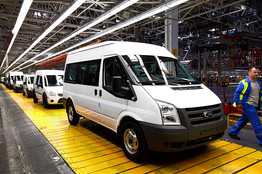By JOE PARKINSON

ISTANBUL—Turkey, rarely thought of as a global automotive hub, will this year overtake the Czech Republic as the biggest car maker in Eastern and emerging Europe outside of Russia, according to industry forecasts.
Turkey is producing almost one-third more cars this year than last, said the country’s Automotive Manufacturers’ Association, in a rebound that underscores the dramatic recovery of the nation’s economy from the global financial crisis.
Sales of cars and light commercial vehicles in Turkey were up 31% this year through November compared with a year earlier, according to figures released Monday, and manufacturers say they are struggling to meet demand.
According to industry analysts IHS Automotive, that puts Turkey on track to produce 1.05 million vehicles this year, more than the Czech Republic or Slovakia, which, aided by low-cost skilled labor, became the car-making powerhouses of emerging Europe after joining the European Union in 2004.
Turkey’s auto boom goes a long way to explain the country’s growing international confidence, said Ali Pandir, chief executive of Tofas, Turkey’s biggest car maker. With an economy that expanded as fast as China’s in the second quarter, politicians and companies here are expanding relationships in the Middle East and Africa, even when that causes tension with Washington or the European Union.
“Turkey is developing into a globally competitive auto hub, largely under the radar. It has a huge domestic market and the government appears to be reforming the economy in a way investors find attractive, so its growth is likely to continue,” said John Wormald, director of Autopolis, an auto-industry consulting firm.
Auto exports are surging. Seven out of every 10 vehicles made in Turkey are exported, and much of the expansion is coming in the Middle East and Northern Africa, helping to pick up slack for softer demand in crisis-riven Western Europe, according to data from the Turkish Automotive Manufacturers’ Association. The $22 billion auto industry employs more than 230,000 workers, and accounts for 20% of Turkey’s total exports, according to Deloitte, a financial-advisory firm.
Chery Automobile Co. of China committed last month to build a factory to assemble cars for the European market here. Ford Motor Co. and Renault SA’s local partners are expanding operations—in Renault’s case with a commitment to build some of its new Fluence electric cars in Bursa, some 155 miles south of Istanbul.
Other parts of the automotive-supply chain are also betting on Turkey. German auto-parts supplier Mann & Hummel Group last month said it would start production in Turkey within two years and that Istanbul would become its base for expanding operations in the Middle East and former Soviet Union.
Still, Turkey’s car industry faces hurdles. There are no domestic Turkish brands, while sizable sales taxes on cars and gasoline have long suppressed demand. Taxes on car sales add 89% to the price of a 1.7-liter Ford Mondeo, while for a luxury car like a Ferrari the tax rises to 112%.
Even now, many of the cars made in Turkey are slightly older designs aimed at less-wealthy buyers both here and in poorer markets.
So far, there is no sign the government would lower auto-sales taxes. In fact, this year the taxes rose when the government removed a discount granted as part of a stimulus package during the financial crisis.
In Turkey “people evade taxes, but they pay their taxes as they buy their cars,” said Ali Babacan, deputy prime minister for the economy at a recent conference in Istanbul. Noting that car sales are up despite a tax increase, he said he won’t be cutting them soon.
Analysts caution that the current boom in car sales could be short-lived. “We have some pent-up demand which is flattering the market—and going forward that will be removed,” said Alper Paksoy, an analyst at EFG Securities in Istanbul.
Yet for car makers, other trends bode well. Middle-class Turks have been getting richer quickly in recent years. Turkey’s gross domestic product per capita was just $2,900 in 2001, lower than Mexico’s, but it had more than quadrupled to $13,905 in 2009, according to World Bank figures.
via Turkey Emerges as Auto Powerhouse – WSJ.com.

Leave a Reply